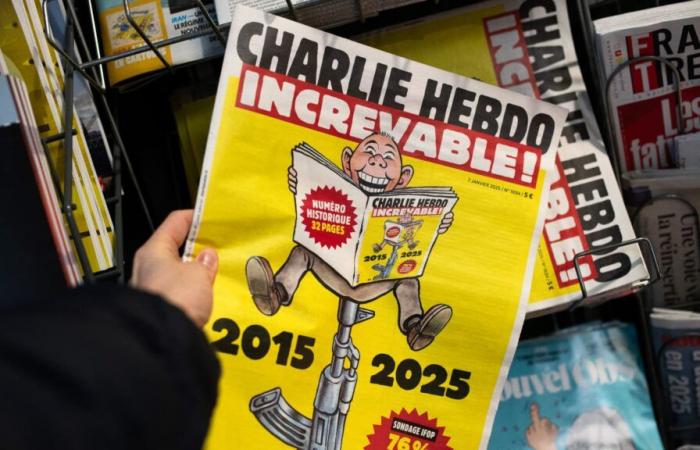The satirical weekly publishes a special issue this Tuesday, January 7, ten years after the terrorist attack which left 12 dead. An issue in which an investigation reveals the relationship that the French have with the right to caricature and freedom of expression.
10 years after the terrorist attack against the weekly, the French support freedom of expression more than ever. This Tuesday, January 7, 2025 marks the tenth anniversary of the attack on Charlie Hebdo perpetrated by the Kouachi brothers and which left 12 dead.
On this occasion, Charlie Hebdo publishes in its special issue a study carried out by Ifop for the Jean Jaurès Foundation on the French relationship with freedom of expression, satire and press cartoons.
62% support freedom of the press
Among the lessons learned from this, a notable development is noted: 76% of French people questioned believe that freedom of expression is a fundamental right and that freedom of caricature is one of them compared to 58% in a previous survey conducted in 2012 by TNS Sofres.
Conversely, 24% of respondents consider that we cannot say anything under the cover of freedom of expression compared to 35% in 2012. But the survey also highlights a generational divide: 32% of young people under 35 year olds maintain that we cannot say and caricature anything under the guise of freedom of expression, compared to only 21% of 35-64 year olds.
The French are at the same time more and more favorable to the law of July 1881 on freedom of the press which authorizes the expression of criticism or mockery against religions: 62% of them support it today. today compared to 50% in 2020.
55% of French people also consider that in France, the press is free and that Charlie Hebdo did not have to censor itself and could therefore publish caricatures of the Prophet Muhammad in 2006, i.e. 4 points more than in a previous survey by Ifop released in 2012 (51%).
Since January 2015, the French’s perception of caricatures has also evolved slightly: 19% of them say they attach more importance to them and to press cartoons since the attacks, 67% grant the same importance to these while 14% attach less importance to them.
For the authors of the survey, these figures “contradict the idea that the French are less and less mature in understanding caricature and more and more hostile to laughing at subjects considered ‘sensitive’”.
Can we laugh at everything? Not for a majority of French people
On the other hand, support for Charlie Hebdo through demonstrations is less present than a few years ago. If in 2020, 80% of French people said – if they met again in January 2015 – they wanted to participate in the minute of silence organized in tribute to the journalists who were victims of the attack, the proportion is lower (74%) in June 2024.
In addition, 44% said in June 2024 that they wanted to participate in the Republican marches organized under the slogan “Je suis Charlie” compared to 53% in August 2020.
The perception of “laughing at everything” has barely changed. 62% of French people consider that today in France, we cannot laugh at everything, a proportion similar to that of an OpinionWay survey for Licra carried out in 2015. 38% of them now consider it possible to be able to laugh at all in France compared to 37% ten years ago.
The fact remains that nearly seven in ten French people (69%) enjoy reading press cartoons. And if tomorrow there were no more press cartoons, a large majority of French people (65%) indicate that they would miss it.
The survey was carried out among a sample of 1,000 people, representative of the French population aged 18 and over. The representativeness of the sample was ensured by the quota method (sex, age, profession of the person interviewed) after stratification by region and category of agglomeration. The interviews were carried out by self-administered online questionnaire from May 31 to June 1, 2024.
Hugues Garnier and Véronique Fèvre






